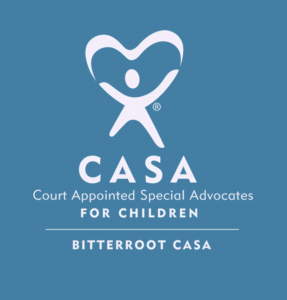This year’s recipient of the Bitterroot Chamber of Commerce ‘Community Asset’ award can truly be described as an asset. Bitterroot CASA, or Court Appointed Special Advocates, is an entity that has served the Bitterroot Valley for 20 years, and has advocated for the best interest of 54 local children in the last eleven months alone. With a current roster of 19 dedicated CASAs (volunteers), this non-profit organization fosters the health of the community. It is the role of these advocates to serve as the ‘eyes and ears’ of judges, who in turn make important decisions about the child’s well-being. Allison Dunne, the Executive Director of Bitterroot CASA, says that a CASA’s role is, “to develop a relationship with the child and represent that child to the judge.”
The CASA program was the result of an effort by Seattle juvenile court judge, David W. Soukup, who in 1976 realized that decisions he was obligated to make regarding the well-being of children who had suffered abuse, could be better informed. Advocates for the children, trained volunteers who get to know them and know their interests, would be able to speak up for that child in court. Since its inception, CASA has expanded to every state in the nation, received the President’s Volunteer Action Award under President Ronald Reagan, and last year had Congress declare May 18th as ‘CASA/GAL Volunteer Day.’ While not every jurisdiction in the country has access to CASAs, the Bitterroot Valley does.
In Ravalli County, Bitterroot CASA is assigned to every child that is removed from a home after involvement by state Child Protective Services. Once a child’s case is opened in the court system, a CASA volunteer is assigned to the child, and will advocate for that child’s best interest for as long as the case is pending. The continuity is important because, unlike teachers and social workers who may change on a regular basis, the CASA will be a familiar face to that child in the long run. “The CASA is the one that stays with them through the entire process,” says Dunne, “and in 90% of the cases stays with that child for the rest of their life.”

Allison Dunne has been with Bitterroot CASA for three years, and came from a background of service to her community through her past work as an AmeriCorps Project Director, and in her work for a YWCA homeless program. She says that she sees her work with Bitterroot CASA as a part of her overall vision of building community. “I’ve always seen my role as helping people to see their own capacity to do good,” she says. She acknowledges that people in her line of work don’t always get immediate results, but that building of social networks and support programs can have a long lasting impact.
“If my neighbor’s kids aren’t safe, my kids aren’t safe,” she says.
Bitterroot CASA receives about 25% of its funding from the Montana Supreme Court, and supplements the remainder through extensive grant writing to entities such as VOCA (Victims of Crime Act), as well as local support. Local children who are in need of a CASA are, after all, victims of a crime. Their future well-being as adult members of the community is exactly why Bitterroot CASA can be thought of as an asset.
“These are children,” reminds Dunne. “They are not their parents and they are not what happened to them. They are affected by what happened to them. They want security and permanency. They want to wake up in the same world every day.”
Dunne says that Bitterroot CASA is currently in need of more volunteers. The requirements are that they be at least 21 years of age, willing to receive 30 hours of pre-service training, a background check and interview. Selected volunteers will also agree to an average of 15 hours a month service.
Dunne reiterates that CASAs are not investigators, and are not present with the child to dig deeply into ‘what happened.
“We dig deep into what their interests are, what they want to be when they grow up, things they like to do,” she says. “All of our advocates love this work. They care for the kids, they care for the outcome. They are willing to stand with these kids who are in pain, and to walk through it.”
While Dunne acknowledges that working with the child’s parents can be difficult, she says, “Most of our volunteers understand that these parents were injured themselves. No individual who was raised in a healthy, happy home grows up and abuses their children. Abused grow up to be abusers. People in pain create pain. Our advocates know that.”
To find out more about volunteering with Bitterroot CASA, contact Dunne at 406-961-4535 or email her at: bttrcasa@msn.com.
To report child abuse call the statewide Child Abuse Hotline at 1-866-820-KIDS.
